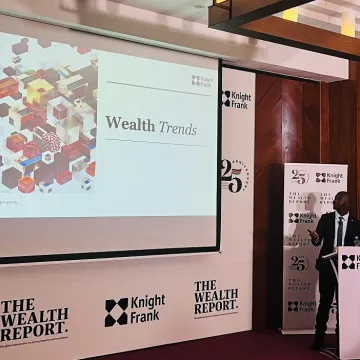Kenya's wealthy investors look inward amid rising global uncertainty

Knight Frank CEO Mark Dunford.
Faced with mounting global uncertainty as President Donald Trump charts new trade ties with traditional business allies, Kenya’s high-net-worth individuals (HNWIs) are recalibrating afresh on where to channel their investments.
For many, gone are the days of stockpiling foreign properties and luxury residences; today’s affluent people are redirecting their wealth into homebased opportunities that promise both liquidity and resilience.
According to the Knight Frank Wealth Report: Kenya Edition–Attitudes Survey 2025, the country’s richest are eyeing investments in industries such as food production, technology, and renewable energy—areas that are emerging as both future-proof and of critical national importance.
"In global terms, Kenyan returns remain sharply ahead of the world average, and rising uncertainty in many global markets is only serving to heighten HNWIs' interest in their home market," stated Mark Dunford, CEO, Knight Frank Kenya, during the release of this year's wealth report.
This recalibration towards the home market comes as growth in the number and wealth of Kenya’s elite slowed last year, with over 60 percent of wealth managers reporting uptick of less than 10 percent in the HNWI category. Yet, amid this muted expansion, investor confidence remains intact.
Knight Frank attributes this shift to a deliberate strategic pivot—one that favours productive, high-yield domestic assets such as Real Estate Investment Trusts (REITs), treasury instruments, and direct impact ventures over the traditional allure of offshore holdings and vacation homes.
"With the slowdown in 2024, particularly in sectors that have been key to wealth creation, such as construction and mining, dampening overall wealth creation, there has been a considerably rapid shift in HNWIs' portfolios and priorities," added Boniface Abudho, a research analyst at Knight Frank.
Knight Frank Wealth Report also reveals a significant shift in asset allocation among HNWIs, with the proportion of wealth held in personal homes declining sharply from 60 percent in 2023 to just over 20 percent last year.
Additionally, the percentage of HNWIs owning four or more homes dropped from 37.5 percent in 2023 to 22.2 percent in 2024, the survey observes.
However, the report highlights a growing sense of domestic focus among the wealthy Kenyans, as evidenced by a decline in foreign homeownership. As of last year, only about 10 percent of Kenyan HNWIs own homes abroad, down from 14 percent at the start of 2023.
Of the HNWIs planning to purchase a further home this year, Knight Frank survey shows only 66 percent now favour Kenya as their first option, reflecting solid growth from 33 percent previously, further reinforcing the shift in interest towards domestic investment.
Additionally, the new report singles out data centres as the top investment of choice on target by Kenya's wealthy in 2025, closely followed by development land, together representing over 28 percent of first-choice investments.
Other key areas of interest include farmland, hotel and leisure, logistics and industrial, and office spaces, with 83 percent of farmland investors focusing specifically on food production.
According to the report, while commercial property remains a long-standing pillar of HNWIs' investment and continues to attract capital, interest has softened, with 50 percent of wealth managers reporting that fewer than 10 percent of their clients plan to invest in this asset class in 2025.
Overall, the wealthy's measured approach and shift towards funds and revenue producing assets is fueling cautious optimism, with almost half (48 percent of respondents) expecting a marginal increase in wealth in 2025 and 26 percent anticipating increases exceeding 10 percent.





